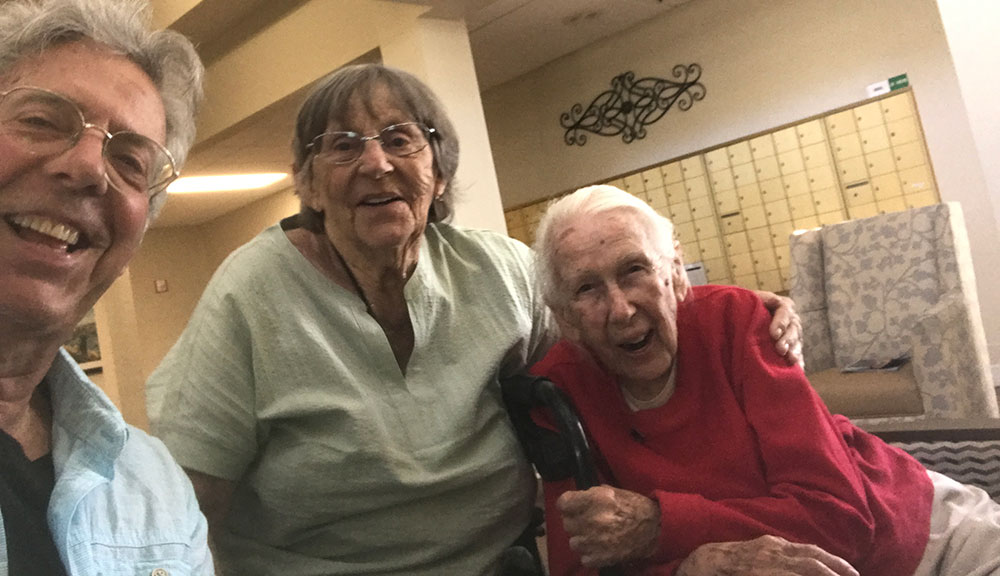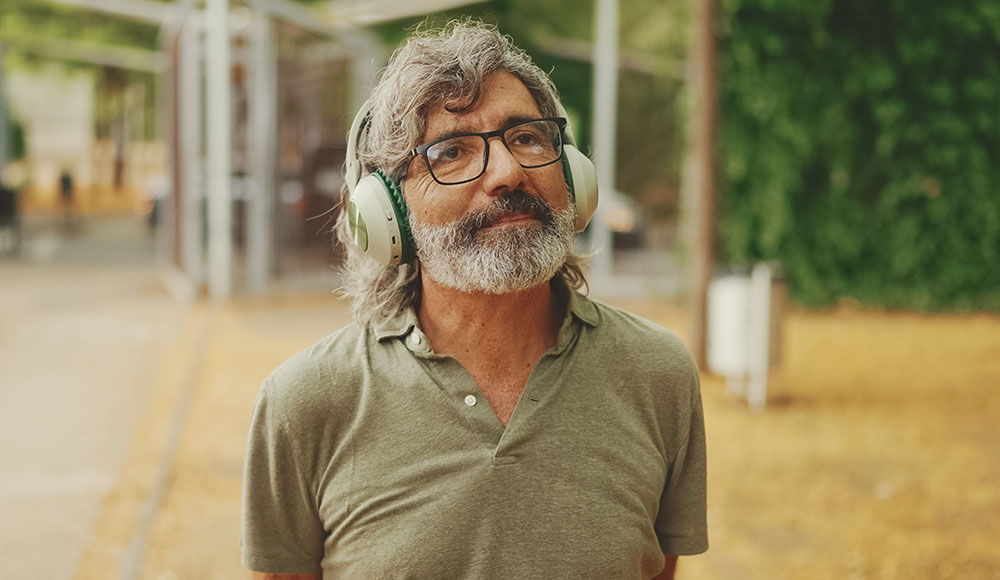This story is about your favorite songs. When you first heard them, you immediately wanted to hear them again. They stayed in your head for a month. While your body moved to their beat, everything that happened to you then, the memories of all of it, can come back to you through these songs.
I sang the Elvis tune “Are You Lonesome Tonight?” at Holiday Warburton Place, a memory care facility in Santa Clara. I noticed one resident named Beverly singing along. I got to the line “Do you gaze at your doorstep and picture me there?” and Beverly’s eyes filled with tears. She caught her breath and her face looked like she was tasting something almost too sweet.
After the song ended, I asked her, “Beverly, what happens when you hear that line?”
“I see my husband coming in the front door, coming home to me from Vietnam.”
It’s 2:45pm and I’m setting up my sound equipment in the sunny activities room of Sunshine Villa Assisted Living and Memory Care in Santa Cruz. Laughing caregivers are wheeling in my audience, cajoling the residents not to go too wild when the music starts. Half of them live here for physical assistance alone; they are every bit as sharp as I am, and they waste no time in needling me.
“Last guitar player we had didn’t know any Patsy Cline and that man disappeared without a trace. Hope that doesn’t happen to you.”
I say, “Well, sir, I do go Walking After Midnight when I Fall to Pieces, and just so you know who you’re dealing with, I’m Crazy.” Half of the crowd bursts into applause, delicate fists pump in the air.
The other half sit silently in their wheelchairs; some stare at the floor. I’ve performed here before, but the quiet ones don’t remember me and don’t know why I’m here.
A woman in the front row is bent over in her wheelchair with her eyes closed. I ask the nurse about her, and she says, “That’s Delores. Her file says she used to sing along with Johnny Cash records, but that was before I got here.”
I launch into “Ring of Fire,” selling my Johnny Cash baritone vibrato for all I am worth. Delores lifts her head. I go into “Folsom Prison Blues” and at the end of the first verse, Delores looks up at me, her eyes go wide, her mouth opens wider, she gasps for air and exclaims, “Johnny Cash! Momma told me not to listen to him, but I did anyway. I love Johnny Cash!”
After my set, the nurse says, “Richard, I’ve been here for two years and that is the first time I’ve heard Delores speak.”
PENETRATING THE FOG
For entertainers, a rush comes when you can wake someone up with a song from their youth. It’s a magic moment. And it’s a moment I missed having with my own father.
Losing my father to Alzheimer’s felt like I was watching him fall backwards off a cliff in slow motion, seeing that powerful, shining man who gave me everything disappear from view. As his incandescent spirit receded further and further from his sense of self, I ached to know if his memories were still somewhere inside him. Who are we but the stories we live?
If I would have known what I know now, I could have played my father’s favorite songs, awakened his memories and gotten to know him better.
Studies from Harvard Medicine explain what’s going on between Johnny Cash and Delores; music we heard in our late teens and early 20s can create neuroplasticity—a rewiring of the brain. The right song can penetrate even the thickest fog of dementia.
Science is finding out why. Medicalnewstoday.com reports, “music can increase the speed of nerve impulses by inducing the formation of myelin, which wraps around nerve cell processes, and by increasing synapses—the connections between nerve cells. It may drive the generation of new nerve cells.”
Neuroplasticity really happens. As they say in the neurology crowd, “Nerves that fire together wire together.”
FREE THERAPY
The 2014 film Alive Inside is a story of music and memory. It is the journey of a social worker named Dan Cohen as he campaigned to bring iPods to nursing homes to help people with Alzheimer’s and dementia.
The film follows the 90-year-old Alzheimer’s patient Henry Dryer. It opens with Henry not communicating with the outside world; he looks catatonic. His nurse says, “He is very isolated, and he sits with his head resting on his hands. He doesn’t talk to people.”
Then Cohen puts headphones on Henry so he can listen to his favorite artist, Cab Calloway. Henry immediately wakes up, moves to the beat and starts singing along. And starts talking.


Cohen reports that 1.6 million Americans are living in 16,000 nursing homes, plus 1 million people living in assisted living facilities, and 40% of those have some form of dementia as well. Five million Americans have some form of dementia.
According to Cohen, “The American healthcare system is apparently more interested in pushing costly pharmaceutical treatments than any kind of therapeutic model. Music offers you a therapy that is free, with no side effects, that you can do anytime, and will boost your brain power.”
RETRACING TRAILS
When I was 14, my two favorite things were my basketball and my transistor radio. I always had it tuned to KROY 1240 AM in Sacramento because they played James Brown. I would shoot baskets at Arden Park endlessly, only to stop when KROY played James Brown and then I would scream with him, “Whoaowww! I feeeeel good!”
Sixty-one years later I hear “I Feel Good” and I can see a basketball leaving my fingertips, arc high into the air, spin backwards, watch it drop through the hoop and hear the swish. That’s who I was, and James Brown helps me remember that’s who I still am.
Music connects to the memories that are our life story.
My dad and I differed in our relationship to music. He told me he tried to join the Bakersfield High School Glee Club, but they threw him out when it became obvious that he was only there to meet girls. Man, he had to have had a song or two that moved him. I would give anything to have played those for him.
As for my end, to paraphrase General Douglas MacArthur, “Old hippies never die, they’re just out of sight.” As I get more and more out of sight, I know I will feel ever more challenged to move with grace and power. Even if someday I struggle to remember who I am, as long as I can dial up James Brown, I’m always going know I was that kid who would rise off the court with a basketball leaving his fingertips.
I wish I would have known to play music for my dad. I do know I can connect with my brother through music, and I know now that I can use music to remind people who they are, who need that song that turned them on to restore their sense of identity. I close my memory care show with the Roy Rogers and Dale Evans song “Happy Trails,” and every one of them sings along.
Happy trails to you, until we meet again
Happy trails to you, keep smiling until then
Who cares about the clouds when we’re together?
Let’s sing a song and bring the sunny weather
Happy trails to you, ’til we meet again
Special thanks to contributor Julie Flannery for her editing and story help.




How can I get in touch with Richard Stockton. I would like to bring music to people with memory loss.